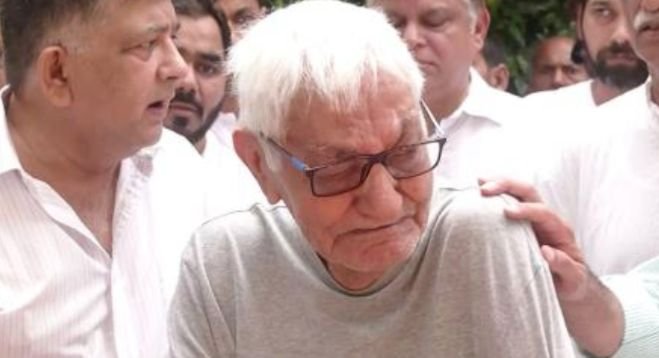The Supreme Court on Friday extended emotional reassurance to the 91-year-old father of late Air India pilot Captain Sumeet Sabharwal, who lost his life in the tragic plane crash in Ahmedabad, stating that his son should not be held responsible for the accident. The bench, comprising Justices Surya Kant and Joymalya Bagchi, clarified that there is no evidence or official indication suggesting pilot error in the incident.
The court was hearing the father’s plea seeking a fair and transparent inquiry into the crash, which occurred on June 12 and resulted in the loss of 260 lives. The casualties included 229 passengers, 12 members of the cabin crew, and 19 people on the ground. The aging father approached the court with the belief that his son’s reputation had been unfairly questioned, leading to immense emotional suffering for the family.
During the hearing, the bench told the petitioner that he must not internalize guilt or blame. “You should not carry this burden on yourself,” Justice Surya Kant said, adding, “Your son is not to be blamed for the crash. It was an accident. There is no allegation or insinuation against him even in the preliminary inquiry report on record.”
The bench also issued notices to the Union Government and the Directorate General of Civil Aviation (DGCA), seeking their response to the issues raised in the petition, particularly concerning the investigation procedures and the conclusions drawn in early assessment documents.
The court took note of an article published in the Wall Street Journal, which allegedly attempted to place responsibility on the pilot. The bench remarked that the report was speculative and unfair, emphasizing that such external narratives should not influence the official understanding of what happened. Justice Bagchi noted that, “This appears to be sensational reporting aimed at assigning blame without proper basis.”
The petitioner’s counsel argued that the late pilot had maintained an exemplary professional record, and that attributing fault to him without conclusive evidence was both unjust and deeply painful to the family. The Supreme Court acknowledged the sensitivity of the matter, assuring that the dignity of the deceased pilot must remain preserved throughout the legal and investigative process.
The June 12 crash remains one of India’s most devastating aviation tragedies in recent decades. Official findings from ongoing investigations are still awaited, with authorities examining technical, operational, and environmental factors that could have caused the disaster.
For now, the Supreme Court’s observations serve as a moment of relief for the pilot’s family, affirming that Captain Sumeet Sabharwal’s memory should not bear the shadow of blame, especially without any grounded proof. The matter will now proceed once responses from the Centre and DGCA are placed before the Court.





